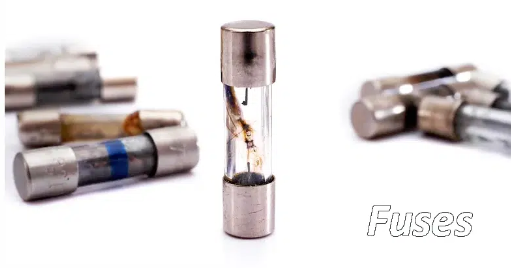- Ameya360 Component Supply Platform >
- Trade news >
- What’s the difference between fuses and circuit breakers?
What’s the difference between fuses and circuit breakers?
In the world of electrical systems, safety is paramount. Two essential components that play a crucial role in maintaining electrical safety are fuses and circuit breakers. These devices serve as protective mechanisms, preventing potential hazards such as electrical fires and equipment damage. In this article, we will delve into the functions, types, and importance of fuses and circuit breakers in ensuring the stability and safety of electrical circuits.

Fuses
A fuse is a simple yet effective device designed to protect electrical circuits from overcurrent conditions.
Comprising a wire or filament, fuses are placed in series with the circuit. When the current exceeds a safe level, the wire inside the fuse melts, breaking the circuit and preventing further damage.
Fuses are categorized based on their time-delay characteristics and current ratings.
Types of FusesFast-Blow Fuses: Fast-blow fuses, also known as quick-acting fuses, respond rapidly to overcurrent conditions.
Slow-Blow Fuses: Slow-blow fuses, or time-delay fuses, have a delayed response to overcurrent conditions.
Cartridge Fuses: Cartridge fuses consist of a cylindrical body and two metallic end caps.
Blade Fuses: Blade fuses, also known as spade fuses, are flat, rectangular fuses with metal blades on each end.
Glass-Tube Fuses: Glass-tube fuses consist of a glass tube containing a metal wire or filament.
Resettable Fuses (PTC Fuses): Positive Temperature Coefficient (PTC) fuses are resettable fuses that automatically return to their normal state after the overcurrent condition is removed.
High Voltage Fuses: High voltage fuses are designed for use in high-voltage electrical systems.
SMD (Surface Mount Device) Fuses: SMD fuses are compact fuses designed for surface mount applications on printed circuit boards (PCBs).
HRC (High Rupturing Capacity) Fuses: HRC fuses are designed to handle high fault currents and provide protection in industrial and power distribution systems.
DIN Fuses: DIN fuses adhere to the standards set by the Deutsches Institut für Normung (DIN), commonly used in European electrical systems.
Circuit Breakers
Circuit breakers are automatic switches that open when the current exceeds a predetermined limit, providing a resettable alternative to fuses.
Unlike fuses, circuit breakers do not require replacement after each trip. They can be reset once the cause of the overcurrent is addressed.
Circuit breakers are available in different types, including thermal-magnetic, magnetic, and electronic.
Types of Circuit BreakersThermal-Magnetic Circuit Breakers: Utilize bimetallic strips and magnetic elements to provide protection against both overloads and short circuits.
Magnetic Circuit Breakers: Respond specifically to sudden, high-current surges and are often used in conjunction with other protective devices.
Electronic Circuit Breakers: Use advanced electronics for precise and selective protection. They are common in modern, sophisticated electrical systems.
Importance of Fuses and Circuit BreakersSafety: The primary purpose of both fuses and circuit breakers is to ensure the safety of electrical systems and prevent hazards such as fires and equipment damage.
Protection Against Overloads: Fuses and circuit breakers protect circuits from excessive current, which can lead to overheating and damage to components.
Convenience and Cost-Effectiveness: Circuit breakers offer the convenience of resetting after a trip, eliminating the need for frequent replacements as with fuses.
Online messageinquiry
- Week of hot material
- Material in short supply seckilling
| model | brand | Quote |
|---|---|---|
| TL431ACLPR | Texas Instruments | |
| BD71847AMWV-E2 | ROHM Semiconductor | |
| CDZVT2R20B | ROHM Semiconductor | |
| RB751G-40T2R | ROHM Semiconductor | |
| MC33074DR2G | onsemi |
| model | brand | To snap up |
|---|---|---|
| BP3621 | ROHM Semiconductor | |
| TPS63050YFFR | Texas Instruments | |
| BU33JA2MNVX-CTL | ROHM Semiconductor | |
| IPZ40N04S5L4R8ATMA1 | Infineon Technologies | |
| ESR03EZPJ151 | ROHM Semiconductor | |
| STM32F429IGT6 | STMicroelectronics |
- Week of ranking
- Month ranking
Qr code of ameya360 official account
Identify TWO-DIMENSIONAL code, you can pay attention to


Please enter the verification code in the image below:






















